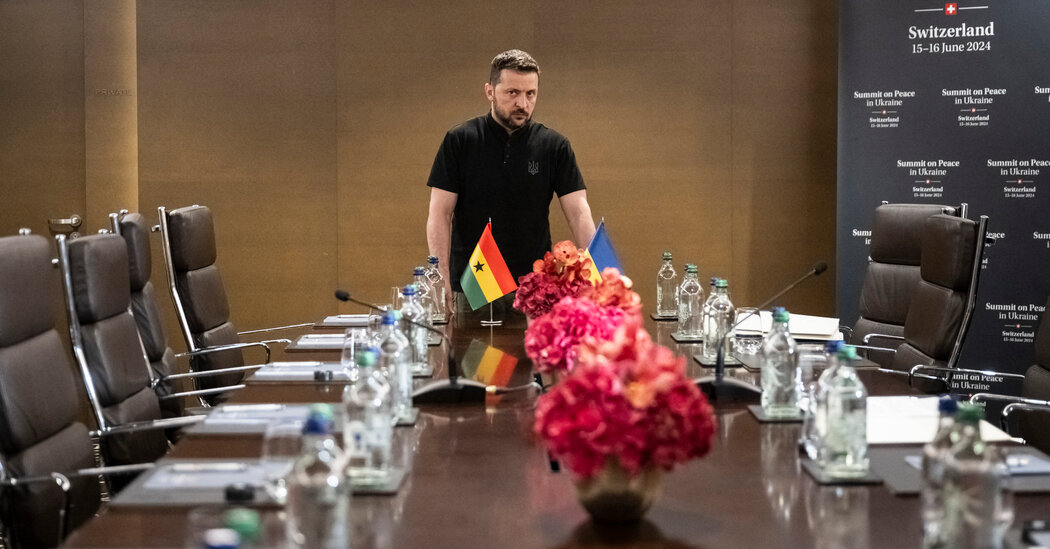Scores of countries at a two-day summit in Switzerland joined Ukraine on Sunday in calling for “dialogue between all parties” to end the war with Russia. But Ukraine’s president, Volodymyr Zelensky, said he remained steadfast in opposing any negotiations that could require his country to cede territory.
The summit over the weekend drew dignitaries from about 90 countries to a Swiss Alpine resort; Russia was not invited and, because of that, China and Brazil declined to participate.
At the end of the meeting, most of the delegations signed on to a statement of shared principles like promoting prisoner exchanges and nuclear safety.
They also said that “further engagement of the representatives of all parties” was necessary to proceed, a vague formulation underscoring the lack of common ground on the biggest question hanging over the gathering: When, and how, should Ukraine and Russia seek to negotiate peace?
With the two countries locked in their third year of all-out war and with no clear path to military victory for either, some world leaders are calling for negotiations and compromise between the warring sides. India, Saudi Arabia, South Africa, Turkey and others repeated that message at the summit.
But Mr. Zelensky has long argued that a lasting peace in Ukraine can be achieved only with Russia’s full withdrawal. He told reporters on Sunday that once the international community formulated a peace plan, building on the conclusions of the summit, “then this approved plan will be passed to representatives of the Russian Federation.”
“And then,” he added, “we’ll see if they are ready to end the war.”
Asked about prospects for talks, he said, “Russia can start negotiations with us tomorrow without waiting for anything if it leaves our legitimate territories.”
For Ukraine, which asked Switzerland to be the host of the summit and worked to bring as many world leaders as possible to it, the event was important for building global momentum behind Mr. Zelensky’s vision for ending the conflict, which also includes reparations and justice for Russian war crimes.
“The ongoing war of the Russian Federation against Ukraine continues to cause large-scale human suffering and destruction and to create risks and crises with global repercussions,” according to the conference’s joint statement, which Switzerland said was endorsed by more than 80 countries.
But India, Mexico, Saudi Arabia, South Africa and the United Arab Emirates were among the handful of countries that declined to sign. A senior Indian diplomat, Pavan Kapoor, said his country did not endorse the statement because “only those options acceptable to both parties can lead to abiding peace.”
South Africa criticized the summit for including Israel and called for a greater push for negotiations between Russia and Ukraine. (South Africa has accused Israel of genocide in the International Court of Justice, a move that Israel has called “despicable.”)
“Our actions should not foreclose the possibility of Russia and Ukraine finding their way to the negotiating table,” Sydney Mufamadi, the national security adviser to South Africa’s president, said in a statement.
Ukraine’s Western allies have said little about possible peace talks with Russia. Ursula von der Leyen, the president of the European Union’s executive branch, said Russia could become “part of efforts to bring the path to peace to its destination” only if it said it was committed to United Nations principles like territorial integrity.
“One key question remains: How and when can Russia be included in the process?” Viola Amherd, the Swiss president, said. “The discussions over the past two days have shown that there are different points of view.”
Swiss officials said the way forward could be to build engagement with Russia on the specific priorities discussed at the summit, including ensuring safe shipping in the Black Sea and the release of prisoners of war.
Ukraine’s main ally, the United States, was represented at the summit by Vice President Kamala Harris, who left on Saturday evening after the first day. On Sunday, President Biden’s national security adviser, Jake Sullivan, told the delegates that the summit had set the stage for future negotiations, without elaborating on when or how they might happen.
Such talks, he said, would build on the gathered nations’ endorsement of “the notion of sovereignty and territorial integrity” outlined in the United Nations Charter.
“That has created a platform upon which Ukraine can stand, going forward, to negotiate from a position of confidence to secure its sovereignty and territorial integrity,” Mr. Sullivan said.
To end the war, diplomatic backing could strengthen Ukraine’s hand in eventual peace talks. But developments on the battlefield would be sure to shape any settlement.
A Russian offensive that began over the winter has shown signs of petering out. It shifted the front line at most by about 15 miles, to the west of the town of Avdiivka, in the Donbas region of eastern Ukraine.
On the Ukrainian side, American ammunition and weaponry are helping to shift the tide in Kyiv’s favor. After months of delay by Congress in approving aid, it has begun to arrive on the battlefield. Ukraine is expected to receive its first F-16 fighter jets this month or next, though they will improve its military’s prospects only gradually, as pilots gain combat skills in the aircraft.
Mr. Zelensky said he would continue his diplomatic push in order to prepare for a second summit at which a peace plan could be presented to Russia. He said Ukraine was already in talks with countries that had indicated an interest in hosting such a meeting.
But Russia has shown little inclination to engage with Mr. Zelensky’s diplomatic track. The Kremlin’s spokesman, Dmitri S. Peskov, dismissed the summit in a television interview broadcast on Sunday, saying that “they’re not going to be talking about peace.”
Reporting was contributed by John Eligon from Johannesburg; Mujib Mashal from New Delhi; and Andrew E. Kramer and Nataliia Novosolova from Kyiv, Ukraine.
